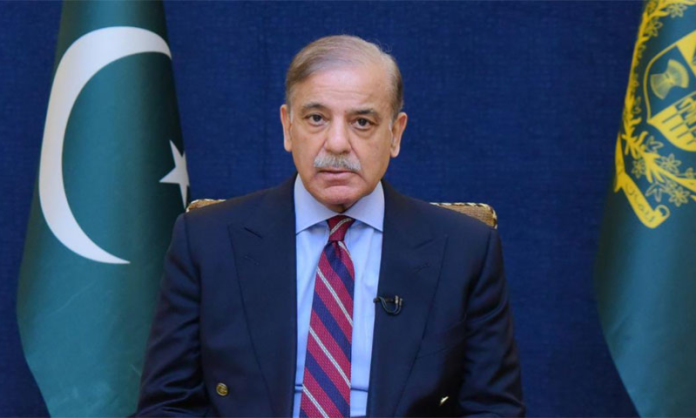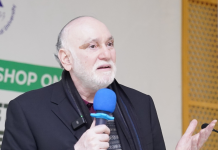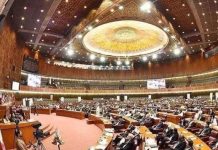UNITED NATIONS, Sep 13 (APP):Prime Minister Shehbaz Sharif on Thursday joined 48 world leaders virtually, to outline their expectations for this month’s Summit of the Future in New York, underscoring “effective” international cooperation to address global challenges, including the developing nation’s rising debt burdens.
“The Summit of the Future represents a great opportunity. We must not lose it!,” the Pakistani leader told the virtual live event as part of a global call to action to support the once-in-a-generation UN summit , which begins on 22 September at UN Headquarters.
Over 130 Heads of State and Government are expected to attend the landmark event, which will be held just ahead of the annual high-level debate in the UN General Assembly, which opens on Sept 24.
The Summit brings together countries from around the world, marking a critical opportunity for far-reaching agreements on international collaboration for a safer, more sustainable and more equitable world.
At Thursday’s live event, UN Secretary-General Antonio Guterres was joined by the President of Namibia, Nangolo Mbumba, and the Chancellor of Germany, Olaf Scholz, as co-facilitators of the preparatory process.
During the two-day Summit, member states are expected to conclude negotiations ahead of adopting the Pact for the Future, which aims to chart a path toward achieving the Sustainable Development Goals (SDGs) and respond to emerging challenges and opportunities. It will include a Global Digital Compact and a Declaration on Future Generations.
The SDGs are an internationally agreed set of targets to end poverty, protect the planet and ensure that by 2030 all people enjoy peace and prosperity.
In a video call from Islamabad, Prime Minister Shehbaz Sharif, called for collective efforts to deal with acute world problems, saying, “Today, in times of unprecedented global challenges and escalating conflicts, we are at risk of permanently damaging the notion of ‘we’.
The prime minister added, “A collective ‘we’ requires a degree of equality and justice. The plight of the people of Gaza is a mockery of this ‘we.’
“This ‘we’ becomes marred amidst rising debt burdens for the poor, increasing poverty, growing inequality, intolerance, terrorist violence, illegal foreign occupation, and a skewed approach to climate adaptation.”
In this regard, prime minister stressed the need for significant reform of international financial institutions to achieve SDGs, saying it required enhanced concessional financing, increased Official Development Assistance (ODA), and greater lending from Multilateral Development Banks.
“Above all,” , he added, “we need innovative financial solutions to address debt challenges, including climate debt swaps and equitable debt relief mechanisms.”
Prime Minister Shehbaz Sharif emphasized that technological advancements should be accessible to all, particularly the citizens in the Global South, adding that “Open access to innovations can empower our people.
“At the same time, new technologies require new and effective safeguards to prevent the world from their possible misuse.”
Injustices and inequalities, he said, create avenues for malign actors, particularly in nations grappling with climate vulnerability and high debt, which also face terrorism and disinformation.
“To counter these harms, effective international cooperation is more urgent today than ever before,” the prime minister added.
At the outset, Guterres, the UN chief, said, “We need greater global solidarity today and with future generations, better management of critical issues of global concern and an upgraded United Nations that can meet the challenges of a new era”.
While the summit is just days away, it has taken years of effort to get to this point, he said.
Today’s challenges are moving at speeds far too fast for the current tools to solve them due to outdated institutions that are designed for another era and another world, the UN chief warned.
“The Security Council is stuck in a time warp, international financial architecture is outdated and ineffective and we are simply not equipped to take on a wide range of emerging issues,” he stated.
Guterres underscored the world’s ongoing ferocious conflicts, deepened geopolitical divides, the rise of populism and extremism and the crisis levels of poverty among the most pressing issues at a time when the SDGs continue to slip out of reach.
“Twenty-first-century challenges require twenty-first-century problem-solving institutions,” he emphasized, adding that the summit also provides an opportunity to reform the Security Council and international financial architecture.
To achieve the summit’s goals, the UN chief is calling on member states to act swiftly, with vision, courage, solidarity and a spirit of compromise to get the three draft agreements “over the finish line”.
He praised the UN as a unique platform to convene key stakeholders, especially in times of global upheaval.
The need to address the changing nature of warfare, manage the risks of new technologies and recognize the ongoing climate crisis as a ‘threat multiplier of insecurity’ was also brought to the forefront.
“I appeal to all governments to make sure they are as ambitious as possible to restore the hope and trust we need to address the dramatic challenges of our time with a new global consensus”.
Both Namibia’s President Mbumba and Germany’s Chancellor Scholz helped promote the event as an opportunity to hear member states voices on the highest political level about their aspirations for the Pact for the Future and the summit while also reiterating their hopes for the next generations.
“The summit should be a platform for bold ideas and concrete commitments that will reinvigorate the UN and multilateralism for the 21st century,” President Mbumba said.
“We stand at the crossroads between breakdown and breakthrough. I’m sure that we will make the right choice”, said President Scholz, adding that it is time to show the world that there is much more that unites us than divides us.

















